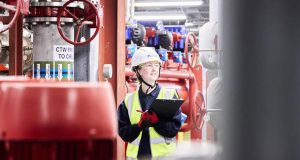A YouGov survey commissioned by British Safety Council among 4,018 UK employers and employees, has found that both employers and employees are optimistic about the impact new technologies, such as artificial intelligence (AI), augmented reality (AR) and virtual reality (VR) will have on their workplace – even though decision makers feel more optimistic than staff.
AI
When asked about AI, 63 per cent of 2,006 employers said they are optimistic about the impact that this new technology will have on their workforce, compared with 41 per cent of 2,012 employees, when asked about its impact on their workplace.
However, just over a quarter (26 per cent) of both employers and employees said that AI would make their workplace ‘less safe’. This compared with the same number of employers (26 per cent) who thought it would make it ‘more safe’ and just 13 per cent of employees.
When asked how likely or unlikely they think it is that their job will be replaced or superseded by AI in the next 10 years, 68 per cent of employees thought it unlikely and just 23 per cent said it was likely. Among the employers, 20 per cent thought less than 10 per cent of their workforce would be replaced by 2034, while six per cent of employers did think that over 50 per cent of their workforce could go.
AR & VR
Levels of optimism about the impact of AR and VR were somewhat lower, with 48 per cent and 51 per cent respectively of employers expressing optimism about the impact of both technologies, and just 33 per cent and 31 per cent of employees. Both employers and employees were also more equivocal about how far these would impact people’s safety in the workplace, with around half seeing ‘no change’.
Peter McGettrick, Chairman of British Safety Council, said: “We commissioned this survey with YouGov to coincide with the 50th Anniversary of the Health and Safety at Work Act and consider what lies ahead for health, safety and wellbeing in the coming half century. The findings show there is clearly more to be done to ensure that both employers and employees not just reap the benefits but are also given reassurance and support on some of the risks.
“While no one can predict the future entirely, change is inevitable. This is why we’re calling on the Government to incentivise companies who invest in new and developing technologies – like AR, VR, and AI – for the purposes of improving workplace health, safety and wellbeing. Alongside this, we want to see more support for training to keep people safe, healthy and well in work.
“Our founder, James Tye, was instrumental in agitating the government of the time to set up a royal commission, which ultimately led to the Robens Report that led to the Health and Safety at Work Act. If you fast-forward 50 years, in recent years we’ve been calling for wellbeing to be at the heart of health and safety. Recently, we’ve called on Sir Keir Starmer in his new Government to put a Minister for Wellbeing in the Cabinet.”
The FM industry is evolving quicker than ever before, and so are the demands of the customers it serves.
To help shed light on some of the trends that are shaping the sector, Biological Preparations, a leading UK biotech company, is conducting a survey in collaboration with FMJ to identify the sustainability priorities and challenges amongst FM leaders.
This five-minute, anonymous FM-focused survey, offers FM professionals of all hierarchies with a platform to voice their perspectives and share their experiences.
As a thank you for taking part in the survey you will be entered into a prize draw to win £250 worth of Amazon vouchers.
To share your experiences, please click here.





